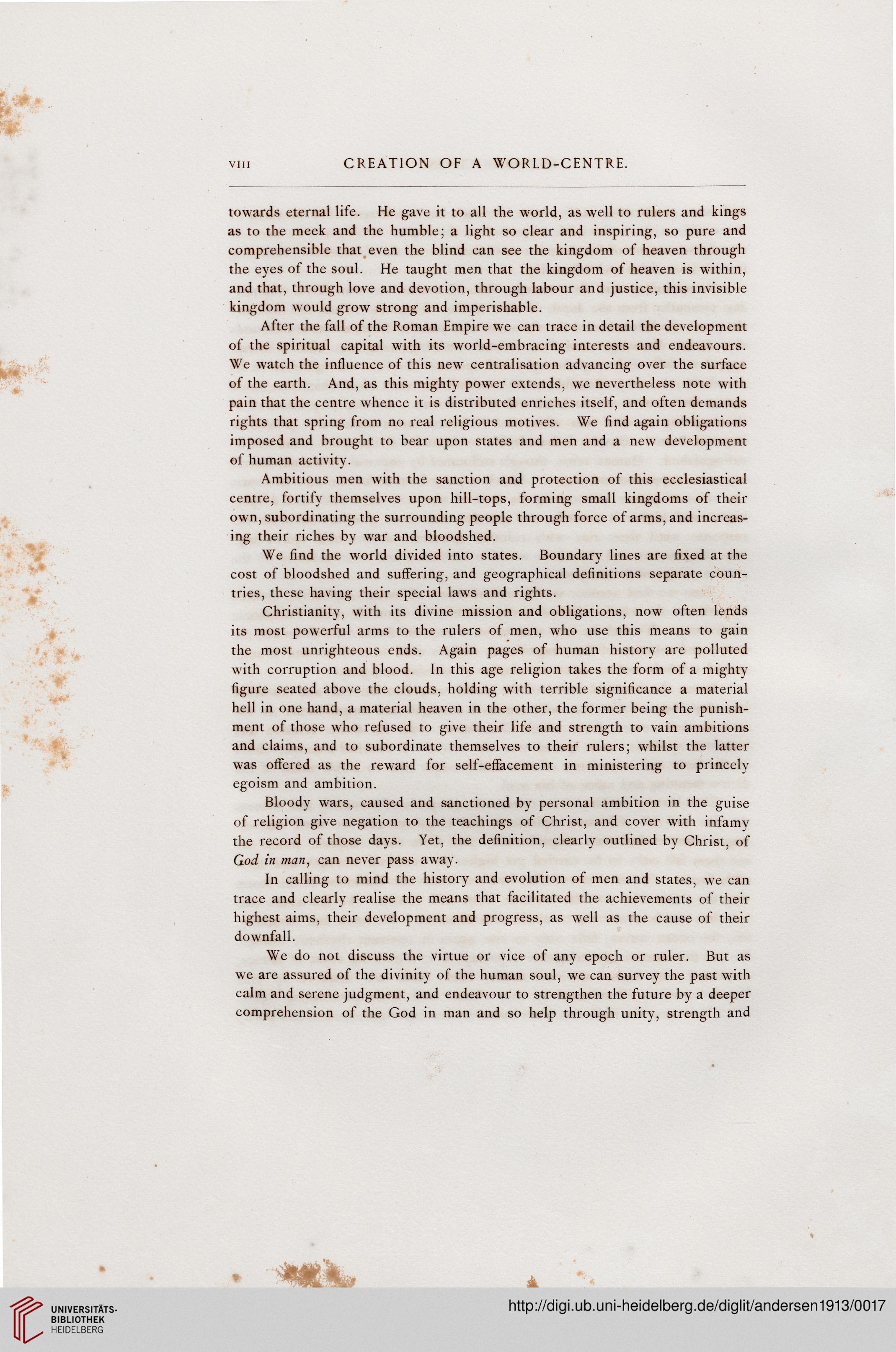VIII
CREATION OF A WORLD-CENTRE.
towards eternal life. He gave it to all the world, as well to rulers and kings
as to the meek and the humble; a light so clear and inspiring, so pure and
comprehensible that even the blind can see the kingdom of heaven through
the eyes of the soul. He taught men that the kingdom of heaven is within,
and that, through love and devotion, through labour and justice, this invisible
kingdom would grow strong and imperishable.
After the fall of the Roman Empire we can trace in detail the development
of the spiritual capital with its world-embracing interests and endeavours.
We watch the influence of this new centralisation advancing over the surface
of the earth. And, as this mighty power extends, we nevertheless note with
pain that the centre whence it is distributed enriches itself, and often demands
rights that spring from no real religious motives. We find again obligations
imposed and brought to bear upon states and men and a new development
of human activity.
Ambitious men with the sanction and protection of this ecclesiastical
centre, fortify themselves upon hill-tops, forming small kingdoms of their
own, subordinating the surrounding people through force of arms, and increas-
ing their riches by war and bloodshed.
We find the world divided into states. Boundary lines are fixed at the
cost of bloodshed and suffering, and geographical definitions separate coun-
tries, these having their special laws and rights.
Christianity, with its divine mission and obligations, now often lends
its most powerful arms to the rulers of men, who use this means to gain
the most unrighteous ends. Again pages of human history are polluted
with corruption and blood. In this age religion takes the form of a mighty
figure seated above the clouds, holding with terrible significance a material
hell in one hand, a material heaven in the other, the former being the punish-
ment of those who refused to give their life and strength to vain ambitions
and claims, and to subordinate themselves to their rulers; whilst the latter
was offered as the reward for self-effacement in ministering to princely
egoism and ambition.
Bloody wars, caused and sanctioned by personal ambition in the guise
of religion give negation to the teachings of Christ, and cover with infamy
the record of those days. Yet, the definition, clearly outlined by Christ, of
God in man, can never pass away.
In calling to mind the history and evolution of men and states, we can
trace and clearly realise the means that facilitated the achievements of their
highest aims, their development and progress, as well as the cause of their
downfall.
We do not discuss the virtue or vice of any epoch or ruler. But as
we are assured of the divinity of the human soul, we can survey the past with
calm and serene judgment, and endeavour to strengthen the future by a deeper
comprehension of the God in man and so help through unity, strength and
4
CREATION OF A WORLD-CENTRE.
towards eternal life. He gave it to all the world, as well to rulers and kings
as to the meek and the humble; a light so clear and inspiring, so pure and
comprehensible that even the blind can see the kingdom of heaven through
the eyes of the soul. He taught men that the kingdom of heaven is within,
and that, through love and devotion, through labour and justice, this invisible
kingdom would grow strong and imperishable.
After the fall of the Roman Empire we can trace in detail the development
of the spiritual capital with its world-embracing interests and endeavours.
We watch the influence of this new centralisation advancing over the surface
of the earth. And, as this mighty power extends, we nevertheless note with
pain that the centre whence it is distributed enriches itself, and often demands
rights that spring from no real religious motives. We find again obligations
imposed and brought to bear upon states and men and a new development
of human activity.
Ambitious men with the sanction and protection of this ecclesiastical
centre, fortify themselves upon hill-tops, forming small kingdoms of their
own, subordinating the surrounding people through force of arms, and increas-
ing their riches by war and bloodshed.
We find the world divided into states. Boundary lines are fixed at the
cost of bloodshed and suffering, and geographical definitions separate coun-
tries, these having their special laws and rights.
Christianity, with its divine mission and obligations, now often lends
its most powerful arms to the rulers of men, who use this means to gain
the most unrighteous ends. Again pages of human history are polluted
with corruption and blood. In this age religion takes the form of a mighty
figure seated above the clouds, holding with terrible significance a material
hell in one hand, a material heaven in the other, the former being the punish-
ment of those who refused to give their life and strength to vain ambitions
and claims, and to subordinate themselves to their rulers; whilst the latter
was offered as the reward for self-effacement in ministering to princely
egoism and ambition.
Bloody wars, caused and sanctioned by personal ambition in the guise
of religion give negation to the teachings of Christ, and cover with infamy
the record of those days. Yet, the definition, clearly outlined by Christ, of
God in man, can never pass away.
In calling to mind the history and evolution of men and states, we can
trace and clearly realise the means that facilitated the achievements of their
highest aims, their development and progress, as well as the cause of their
downfall.
We do not discuss the virtue or vice of any epoch or ruler. But as
we are assured of the divinity of the human soul, we can survey the past with
calm and serene judgment, and endeavour to strengthen the future by a deeper
comprehension of the God in man and so help through unity, strength and
4




